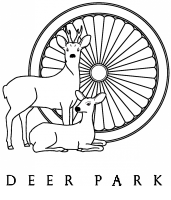Our Projects
Zero Waste Project
Objectives of the Zero Waste Project:
- Raise awareness in the community about the health and environmental impacts of the waste problem.
- Introduce mindful waste management techniques in the community.
- Facilitate the development of waste management action plans between different community groups and the local Indian and Tibetan administrations.
- Promote the local economy, with a focus on traditional crafts and locally grown and processed foods and drinks, packaged in biodegradable alternatives to plastic.
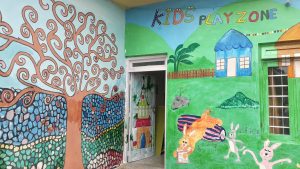
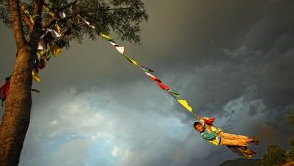
Changing From Inside Out:
Waste Management System at our Campus
Deer Park believes that to effect positive change in the community, we must first start with our own internal approach and practices. Thus we strive to become a model for environmentally sustainable living, which includes following environmentally friendly solid waste management practices and using renewable forms of energy.
Steps taken so far include:
- Segregating all waste in the campus ‘eco zones.’ Recyclables are given to local scrap dealers.
- Organic matter is fed to local cows.
- Non-recyclable waste, such as snack packaging and tetra-paks, are stored in a segregation room until a responsible solution is found.
- We strongly encourage students and guests to reduce consumption of such products.
- Supporting local food production and minimizing consumption of products packaged in non-environmentally friendly materials. Deer Park’s healthy vegetarian meals are cooked primarily with foods grown in our own garden or bought from local farmers.
- Providing a free-refill filtered water system for visitors as an alternative to bottled water.
- Producing a pocket-sized illustrated pamphlet called ‘Mindful Travel in Kangra’, to help visitors to our district reduce the negative environmental and cultural impacts that accompany tourism.
- Raising awareness of local and global environmental issues among our students and visitors, through displays and information sheets posted around the campus, film screenings and workshops. Many of our philosophy and arts programs also incorporate an environmental theme.
- Using solar hot water systems to conserve electricity.
Involving the Local Community
To reduce consumption and promote the Zero Waste model effectively requires far-reaching changes in the habits of the whole community. A key area of Deer Park’s Ecology Project is educating and involving local community members to take responsibility for reducing and recycling waste.
The Joy of Learning Workshop
The Joy of Learning program is an initiative by Deer Park Institute to bring about a change in the lives of children and young people and inculcate ethical human values.
It encompasses:
- Workshops at local schools, colleges, and monasteries
- Workshops at Deer Park Institute for local Indian and Tibetan children
- Five-day Joy of Learning camps for visiting student groups from other parts of India and the world (see sample program below)
- Ecology workshops for visitors to Deer Park Institute
- Training sessions for teachers from local Indian and Tibetan schools
- Eco-handicraft workshops for local villagers at Deer Park Institute
These workshops include environmental awareness and waste management, art and handicraft, learning through stories and games, community service, yoga/tai-chi classes, gardening, camping, local music and dance, cooking, visiting local villages, hikes in the mountains, mindfulness-based activities, chanting, meditation, introduction to Buddhist philosophy and excursions to local monasteries and other sights.
Sample five-day workshop schedule for visiting student groups:
Day 1
Tour around Zero Waste campus: familiarize with the environment
Program design: Collaborative and participatory approach, taking ownership
Mountain orienteering: Learn to develop leadership
Day 2
Bird-watching: Cultivate mindfulness
Hiking and swimming: Be in nature
Movie viewing and discussion: Insight into Tibetan culture and Buddhism from “The Cup” (about a young Tibetan monk arriving in Bir, India)
Day 3
Visit Tibetan school: Cultural exchange with Tibetan children
Walk in the dark: Overcome fear and have fun
Day 4
Karma Yoga: Opportunity to offer help to others
Waste handicraft: Inspiration to recycle waste and creative learning
Bonfire and storytelling: Togetherness and friendship
Day 5
Reflection and sharing of experience (poems drawings, letters): Joy of Learning
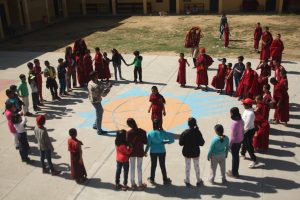
Education Resource Centre
One primary objective of Deer Park Ecological Program is to work towards building an environmental resource centre for the entire Kangra valley. Accordingly, Deer Park is in the early stages of building its library on environmental and ecological topics in Tibetan, Hindi and English languages. Resource materials include reports, books, journals, films, magazines, pamphlets and posters collected from various meetings, training sessions and organizations that program staff have attended or visited.
During 2008 we worked to amass an extensive selection of reputable documentaries on various ecological issues, especially on waste, for local screening. We have interviewed senior activists on the waste issue and posted these clips on YouTube (www.youtube.com/deerparkindia). The interviews have garnered positive feedback online. The Deer Park film team is now working on a short bilingual (English and Hindi) documentary on waste for our awareness campaign.
From May 2008, we began developing an ecology education curriculum for primary and high school teachers to use in their classrooms. This curriculum includes detailed lesson plans on topics such as global warming, the dangers of plastics, waste management, water conservation and sustainable agriculture. Posters with images and illustrations related to these topics will be provided to teachers willing to implement this curriculum in their schools on a regular basis. Based on this curriculum, we plan to conduct more school workshops and teacher training programs.
Sustainable Agriculture
After initiating the Zero Waste project, Deer Park began analyzing other local ecological issues. As with other parts of India, chemical farming has become the most common local practice, while traditional seeds are disappearing. Most of the grains and vegetables available in our local markets are transported from large-scale commercial farms in other parts of India or abroad. In order to promote local food and sustainable agriculture, Deer Park has started small scale interventions through processes like providing a local market for organic food and conducting community-based participatory dialogues on biodiversity issues, food security and livelihood with local farmers. With the support and guidance of individuals and organizations experienced in issues of preservation of traditional wisdom, ecology, agriculture and sustainable livelihoods, we hope to continue this process.
In May 2007, Deer Park co-hosted a Bio-Diversity Meeting with two renowned environmental organizations, Kalpavriksh (from New Delhi) and Grain (from Spain). This meeting brought together over 30 farmers and ecologists from various non-profit organizations of North
India.
In October 2008, Deer Park hosted a 2-day Organic Farming Meeting. The workshop, led by P.V. Satheesh of the Deccan Development Society, was attended by some 35 farmers from the local area, as well as the Kullu and Punjab regions. Participants discussed how to restore biodiversity and maximize local resources through a return to traditional farming practices. They also learned about practical methods for saving seeds and organic alternatives to chemical fertilizers and pesticides.
Deer Park also tries to use sustainable agriculture practices in our own organic garden, which supplies many of the vegetables used by our campus kitchen. Starting from December 2009, with the help of an American permaculturalist, we will be expanding the garden to include various indigenous plants and medicinal herbs. This model garden will be used to introduce these plants and their properties to local people, who in recent years have largely switched to monoculture of non-indigenous plants.
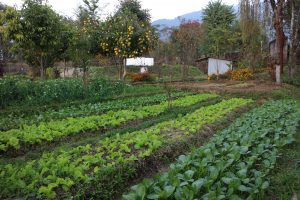
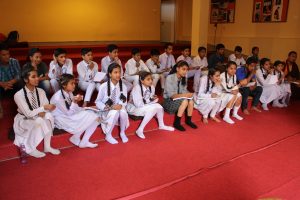
English Course
In 2008, Deer Park started community English classes as a way to reach out to the local Indian and Tibetan communities and engage them in various programs and ecology projects in the Institute. As English is an official language in India and an important means for communicating with Bir’s growing number of foreign visitors, many local Indians and Tibetans are intent on learning it. Although English is taught in schools, fluency is generally quite low.
An average of three community English courses is held every year at the Institute, ranging in length from one to three months, with both introductory and intermediate level classes. The classes are taught by native English-speaking volunteers, emphasizing communication and fun, with certificates awarded to students who successfully complete each level. Each course is attended by an average of 50-60 students, including local Indians and Tibetans of all ages and walks of life.
